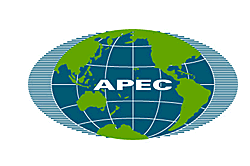

![]()
APEC Energy Week
August 23-27, 1997, Edmonton, Alberta
(Canada)


![]()
APEC Energy Week
August 23-27, 1997, Edmonton, Alberta
(Canada)
General Questions for
Discussion:
1. What kind of energy sources are sustainable ?
2. What kinds of jobs are there in the energy sector? What do people
study if they want to work in this field?
3. How can participation in educational exchange programs and
international work and study placements improve a person's
"employability factor"? Why are these experiences important when
preparing to join the work force?
A glimpse of some of these issues:
Nuclear Energy: A good source of electrical energy?
New sources of electrical energy are being researched all over the world. Ideally, energy sources should be safe for all living things. Nuclear energy has been used to create electricity. At the Energy Youth Workshop, nuclear energy was one of many alternative energy sources that was discussed.
Questions for Discussion:
1. What are the main ways of producing electricity? What are their benefits and drawbacks?
2. What measures do nuclear power plants employ to ensure safety?
3. What new ways of producing electricity are being researched in Canada now?
Click here to see some of the delegates' opinions on Nuclear Energy.
Green Energy: Alternatives that Preserve the Environment
When discussing other options for the traditional energy sources (oil, gas, wood, coal), participants at the Energy Youth Workshop debated the advantages and disadvantages of using these forms of energy.
Questions for Discussion:
1. What are some examples of sustainable energy sources?
2. Do you think the long-term benefits outweigh the short-term costs of using sustainable energy sources?
3. How can we encourage the development and use of sustainable energy sources?
Click here to read about some of the delegates' perspectives on Green Energy.
The Future of Energy: Jobs in Research and Development
The participants chose to encourage APEC Energy Ministers and business leaders to promote research projects lead cooperatively by APEC member economies.
An imaginary example of such a project would be research scientists from China, Mexico and Australia working together to study the benefits of combined wind and solar energy in rural areas. Young people studying in the field of energy would then be able to share information and resources with these scientists and each other. This could in turn create more jobs in the field of energy study in the APEC region.
Questions for Discussion:
1. When you think of working in the energy field, what kinds of jobs do you think of?
2. What affects the future of energy research? Who makes the decisions about what areas should or should not be studied?
3. If you were a student studying in a discipline related to energy, what kind of international collaborative projects would interest you? What kinds of studies would most benefit your community?
Click here to see one delegate's perspective on the future for energy professionals.
Energy | Description | Agenda | Issues | Youth Report | Quotes
![]()
© 1997 - TG Magazine / The Students Commission
© 1997 le magazine TG / la Commission des
étudiants